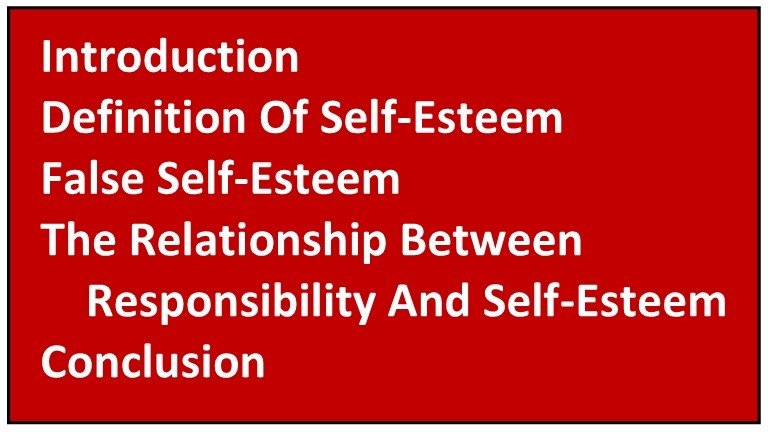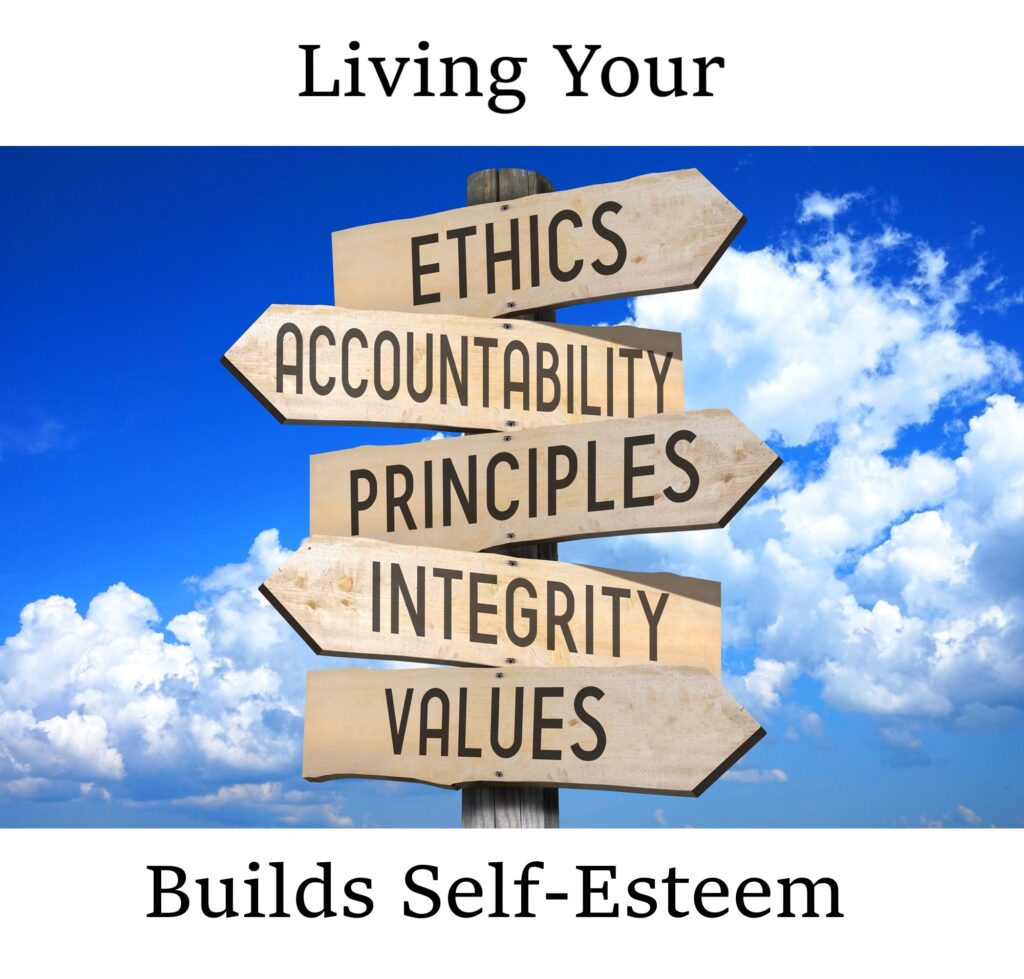Responsibility: A Self-Esteem Necessity
INTRODUCTION
In our last Letter, we considered the importance of responsibility and accountability in relationship to personal power. The aspect of responsibility that we consider here is more accurately called accountability, being held accountable for our behavior, but we will use the word responsibility. We now turn our attention to the relationship between responsibility and self-esteem. We will see that without accepting responsibility and accountability for one’s actions there can be no true self-esteem. This may not seem to be true because false self-esteem can emerge even though there is a denial of responsibility. But it is false esteem not true esteem. In addition to a simple definition of self-esteem, we present a more complex definition that can be more fully explored in The Operating Manual for the Self.
Point Of Empowerment: Self-esteem is a human need, something we must have and continually seek to create for ourself.
DEFINITION OF SELF-ESTEEM
A simple definition of self-esteem is feeling good a bout yourself. You feel happy with who you are. There can be great depth and intensity to these feelings. Or these feelings can be shallow and weak.
bout yourself. You feel happy with who you are. There can be great depth and intensity to these feelings. Or these feelings can be shallow and weak.
Self-esteem is created by me and for me. It is create by a self-evaluation of our behavior according to the standards we hold for ourself. When we feel proud of or pleased with something we have done we are experiencing an increase of our self-esteem. With varying degrees of awareness we are always asking ourselves the question, “How am I doing?” and answering that question with an assessment, an evaluation. The ability to be self-evaluating can begin around age 15 and continues to develop throughout our life. Self-esteem is earned in contrast to self-worth which is given to us as something that is innate to human beings. Human beings are automatically worthy by virtue of being human.
As children, authority figures in our life help us feel good about ourself and therefore help us create self-esteem. As young adults (18-25 years old) and as adults, we create self-esteem for ourself independent of what other people think of us, though we may use feedback from other’s about our behavior. As we conduct this evaluation we need to be objective about our behavior. This can be challenging as we are biased about ourself. We can be self-indulgent and/or overly harsh toward ourself. Empathy and compassion for our self is crucial as they help us be objective.
A more complex definition of self-esteem is outlined in The Operating Manual for the Self. This definition of self-esteem has a number of aspects to it. Self-esteem is defined as having a fundamental and deep good feeling for and about our self, as having a deep positive regard for our self. It is also having the knowledge, conviction, and certainty of our right to exit. People with very low or no self-esteem feel that they have no right to exist and in extreme circumstances commit suicide. (We can say that the right to exist is the right to life, liberty, and the pursuit of happiness.) In creating self-esteem we evaluate our behavior, motivations, and attitudes according to the values, ethics, principles, and ideals we hold. Values, ethics, principles, and ideals give rise to the standards we hold for our behavior. Using this definition of self-esteem helps us understand the various aspects of self-esteem and presents us with a guide for developing self-esteem.
Point Of Empowerment: Self-esteem is created by an evaluation that we perform by ourself, something we do. As adults we do not let the opinions of other people about our behavior increase or diminish our self-esteem. We value the feedback we receive from others but the final decision regarding our self-esteem is made by us.
Let’s consider some examples of building self-esteem or diminishing it.
- You overcame your hesitancy and gave a compliment to a friend who appreciated it. You value giving to make someone else feel better. You overcame your fear that your good wishes would be rejected. Give yourself credit and allow your self-esteem to increase.
- You said no when your friend insisted that you accompany them to an event that you would have hated. You honored your feelings and found the strength to say no. You valued your own wellbeing. Give yourself credit and allow your self-esteem to increase.
- You returned a wallet with cash in it to its owner. You value honesty over simple self-interest. You lived up to your values. Give yourself credit and allow your self-esteem to increase.
- You limited the amount of ice cream you ate despite loving ice cream and craving it. You valued your health and was able to tolerate the feeling of deprivation you felt. You chose long term benefit over short term gratification. Give yourself credit and allow your self-esteem to increase.
- You walked away from a group of friends who were gossiping about an absent friend. Or you did not join in when your friends were attacking a person who was crying but defended her instead. You followed your principle of respecting others in the face of group pressure. You acted on your principle despite possible criticism from your friends or loss of friendship. Give yourself credit and allow your self-esteem to increase.
- You were inadvertently critical of your partner but you decided to be more aware of the impact of your behavior on others. You value self-awareness. You want to live up to the ideal that your behavior always expresses your caring for the welfare of others. Give yourself credit and allow your self-esteem to increase.
- You went to work (or school) even though you really did not want to and could have stayed home. You exercised self-discipline over self-indulgence. Give yourself credit and allow your self-esteem to increase.
- You I saw that your son could get hurt, did not protect him, and he got hurt. Your self-esteem dropped. You forgave yourself for your mistake. Your self-esteem increased. You committed yourself to protecting him more diligently. Your self-esteem rose.
- You have the desire and need to be creative. You quickly drew a simple picture that expressed your creativity. You were pleased with yourself. Your self-esteem increased. By fulfilling your need you increased your self-esteem.
- You were impatient and mean to you child even though he was just being annoying. Your self-esteem is diminished as you did not live up to your value of being a good parent. However, you recognized and took responsibility for your behavior and committed yourself to making a good faith effort to change it. Give yourself credit and allow your self-esteem to increase.
Every one of the above examples can result in diminishing self-esteem if you don’t live up to you values, ethics, principles, and ideals.
- You did not overcame your hesitancy and did not give a compliment to your friend even though you value giving to make someone else feel better. You did not overcame your fear that your good wishes would be rejected. Recognize that your self-esteem was diminished.
- You did not say no when your friend insisted that you accompany them to an event that you would have hated. You did not honor your feelings and find the strength to say no even though value your own wellbeing. Recognize that your self-esteem was diminished.
Point Of Empowerment: These examples show how self-esteem is involved in everything we do, in every moment of our life.
Point of Empowerment: The amount of self-esteem we have changes from moment to moment but the overall amount of our self-esteem tends to be the same over time unless we consciously decide to increase it or become dedicated to living according to our values, ethics, principles, and ideals.
FALSE SELF-ESTEEM
False esteem is created by “egotistical” behavior, behavior that is full of false claims about oneself, bravado, self-inflation, manipulation of others, dishonesty, abuse of power, exploitation, or pride about misdeeds. False esteem generates jealousy and envy and is based on misperception and lack of objectivity.
False esteem can also be created by reliance and dependence on the approval of others. The need for approval is caused by a childhood where parents never approved of their child’s behavior or were overly critical or by parents who were overindulgent, approving of everything their child did. People who rely on the approval of others can never get enough. They continually seek approval especially from authority figures who are parent substitutes. False esteem is a weak foundation for the personality that can crumble at any moment. In response to the demands of other people, false esteem results in weak capitulation or over reactive anger.
False esteem leads to the kind of self-esteem that rationalizes and justifies the abuse of power. False esteem is created by the destructive parts of the ego but yet, is a genuine response to our need for self-esteem. False esteem lacks understanding and is full of distortions. It generates the appearance of self-esteem though real esteem is lacking.
RELATIONSHIP BETWEEN RESPONSIBILITY AND SELF-ESTEEM
As we are saying, self-esteem is created by us with an evaluation of our behavior. If we don’t own our behavior, don’t take responsibility for it, we cannot evaluate it because we don’t have anything to evaluate. There is nothing about our behavior that is meaningful or significant to us or has impact on us. We may have thoughts and feelings about our behavior, but without ownership we actually confine ourself to a surface existence, a life without depth and real substance.
Without a self-evaluation we look to others for that evaluation. They makes judgements about us and we ask if they approve or disapprove of our behavior. We seek their approval, sometimes desperately. We fear their disapproval, a disapproval that seems to drive our self-esteem down and leave us feeling hurt, angry, and in pain. We become subject to, and sensitive about the judgements of others. Without self-evaluation the need for approval and the fear of disapproval becomes a never ending burden that continually weighs us down. We cannot assert ourself and become dependent on other’s good will. This dependency scares us and fills us with resentment.
Point Of Empowerment: Denial of ownership robs us of self-esteem. While accepting responsibility for our behavior in itself raises our self-esteem.
CONCLUSION
In exploring different aspects of self-esteem we have seen how important self-esteem is. We presented a definition of self-esteem and described how self-esteem can be created. We want “rock solid” self-esteem to be our foundation, a foundation that empowers us with the will power and assertiveness we need to create the life we want. In the next Letter we will discuss false responsibility—blame and describe how to reject it. We will also explore the relationship between self-esteem and our conscience.
